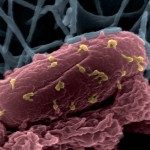Lien vers Pubmed [PMID] – 28704651
Cell Host Microbe 2017 Jul;22(1):38-47
The rise of multi-drug-resistant (MDR) bacteria has spurred renewed interest in the use of bacteriophages in therapy. However, mechanisms contributing to phage-mediated bacterial clearance in an animal host remain unclear. We investigated the effects of host immunity on the efficacy of phage therapy for acute pneumonia caused by MDR Pseudomonas aeruginosa in a mouse model. Comparing efficacies of phage-curative and prophylactic treatments in healthy immunocompetent, MyD88-deficient, lymphocyte-deficient, and neutrophil-depleted murine hosts revealed that neutrophil-phage synergy is essential for the resolution of pneumonia. Population modeling of in vivo results further showed that neutrophils are required to control both phage-sensitive and emergent phage-resistant variants to clear infection. This “immunophage synergy” contrasts with the paradigm that phage therapy success is largely due to bacterial permissiveness to phage killing. Lastly, therapeutic phages were not cleared by pulmonary immune effector cells and were immunologically well tolerated by lung tissues.




